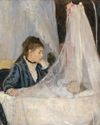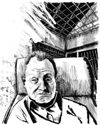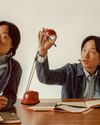
TO EXPERIENCE A THING as beautiful means: to experience it necessarily wrongly,” Friedrich Nietzsche wrote in The Will to Power. It is a line that Susan Sontag quotes toward the end of her 1977 essay collection, On Photography, about how photographs aestheticize misery. It is a line that Sontag’s authorized biographer, Benjamin Moser, quotes to describe Sontag’s susceptibility to beautiful, but punishing, lovers. And it is a line that I am quoting to summarize how Moser’s monumental and stylish biography, Sontag: Her Life and Work, fails its subject—a woman whose beauty, and the sex appeal and celebrity that went along with it, Moser insists upon to the point of occluding what makes her so deeply interesting.
The fascination of Sontag lies in her endurance as a cultural icon, the model of how a woman should think and write in public, even though her thinking and writing weren’t very rigorous. What is intriguing about Sontag is less who she was than how we understand our desire for her, or someone like her, to occupy a rare position in American literary culture: that of a dark-haired, dark-eyed, apparently invulnerable woman capable of transforming intellectual seriousness into an erotic spectacle. What need does such a presence and performance satisfy?
This story is from the {{IssueName}} edition of {{MagazineName}}.
Start your 7-day Magzter GOLD free trial to access thousands of curated premium stories, and 9,000+ magazines and newspapers.
Already a subscriber ? Sign In
This story is from the {{IssueName}} edition of {{MagazineName}}.
Start your 7-day Magzter GOLD free trial to access thousands of curated premium stories, and 9,000+ magazines and newspapers.
Already a subscriber? Sign In

The Dark Origins of Impressionism
How the violence and deprivation of war inspired light-filled masterpieces

The Magic Mountain Saved My Life
When I was young and adrift, Thomas Manns novel gave me a sense of purpose. Today, its vision is startlingly relevant.

The Weirdest Hit in History
How Handel's Messiah became Western music's first classic

Culture Critics
Nick Cave Wants to Be Good \"I was just a nasty little guy.\"

ONE FOR THE ROAD
What I ate growing up with the Grateful Dead

Teaching Lucy
She was a superstar of American education. Then she was blamed for the country's literacy crisis. Can Lucy Calkins reclaim her good name?

A BOXER ON DEATH ROW
Iwao Hakamada spent an unprecedented five decades awaiting execution. Each day he woke up unsure whether it would be his last.

HOW THE IVY LEAGUE BROKE AMERICA
THE MERITOCRACY ISN'T WORKING. WE NEED SOMETHING NEW.

Against Type
How Jimmy O Yang became a main character

DISPATCHES
HOW TO BUILD A PALESTINIAN STATE There's still a way.